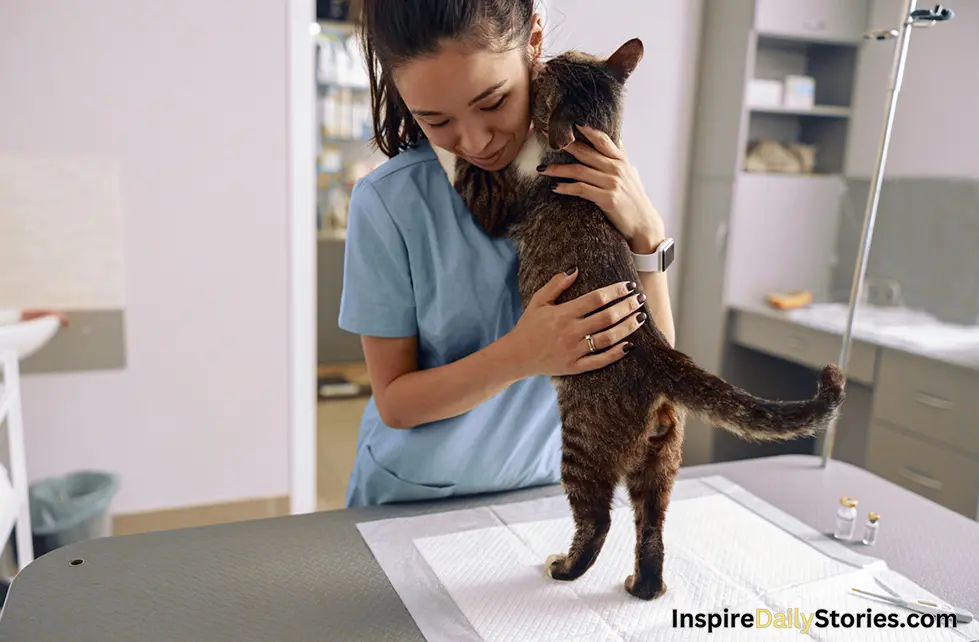How Do You Manage Stress in High-Anxiety Pets?

Introduction
Stress is common in pets, just like in people. It’s important to help pets with high anxiety feel better. There are ways to do this. Let’s learn about them!
A. Explanation of the prevalence of stress in pets
Pets can feel stressed out, just like humans do. It’s more common than you might think! They can get stressed from changes in their environment, like moving to a new home or hearing loud noises.
B. Importance of managing stress in high-anxiety pets
Imagine feeling scared or worried all the time. That’s how some pets feel when they’re anxious. Helping them manage their stress is crucial for their well-being and happiness.
C. Overview of the methods and techniques for managing stress in pets
There are different ways to help pets feel less stressed. It’s like giving them a toolkit for dealing with their worries. These methods include things like creating a calm environment, using toys to distract them, or even giving them special treats that help them relax.

Understanding Pet Stress
Before we can help pets with their stress, it’s important to understand what causes it, how to spot it, and what it does to them.
A. Causes of stress in pets
Pets can get stressed from things like changes in their routine, loud noises, being left alone for too long, or even meeting new people or animals.
B. Signs and symptoms of stress in pets
Just like people, pets show signs when they’re stressed. They might hide, shake, pant, or even become aggressive. Sometimes they might stop eating or grooming themselves.
C. Effects of stress on pet health and behavior.
When pets are stressed for a long time, it can affect their health and how they act. They might get sick more often, have trouble sleeping, or become less interested in playing or being around people. It’s like how stress can make people feel sick or tired.

Creating a Stress-Free Environment
To help high-anxiety pets feel better, we need to make sure they have a calm and comfortable place to live. Here’s how:
A. Importance of a safe and comfortable environment
Imagine feeling scared all the time because your home didn’t feel safe. Pets need a place where they can relax and feel protected from anything that might make them anxious.
B. Strategies for reducing environmental stressors
- Providing a designated safe space: This is like having a special cozy corner just for your pet, where they can go whenever they need to feel calm and safe.
- Minimizing noise and disruptions: Loud noises and sudden movements can scare pets. Keeping things quiet and steady can help them feel more at ease.
- Ensuring adequate exercise and mental stimulation: Pets need to stay active and engaged to keep their minds and bodies healthy. Going for walks, playing with toys, or learning new tricks can help them feel happy and less stressed.

Nutritional Support for Stress Management
Helping pets manage stress isn’t just about their environment or activities. What they eat can also play a big role.
A. Role of diet in pet stress management
Just like people, pets’ diets can affect how they feel. Certain foods can help them stay calm and relaxed, while others might make them feel more anxious.
B. Identifying stress-reducing nutrients
Some nutrients in food can actually help pets feel less stressed. Things like omega-3 fatty acids, vitamin B, and certain amino acids are known to have calming effects.
C. Recommended dietary adjustments for stress-prone pets
If your pet is prone to stress, you might want to make some changes to their diet. This could mean switching to food that’s specifically designed to help with stress or adding supplements that contain stress-reducing nutrients.

Behavioral Modification Techniques
Sometimes, helping pets manage stress involves teaching them new ways to cope with their feelings.
A. Positive reinforcement training methods
This means rewarding pets when they do something good. It could be as simple as giving them a treat when they stay calm in a stressful situation.
B. Desensitization and counterconditioning exercises
These are fancy words for helping pets get used to things that scare them. It’s like gradually introducing them to the thing they’re afraid of in a safe and positive way until they’re not scared anymore.
C. Implementing calming routines and activities
Just like people have bedtime routines to help them relax, pets can benefit from having calming activities too. This could be something as simple as cuddling with them before bed or playing soothing music.
Utilizing Alternative Therapies
When traditional methods aren’t enough, there are other ways to help pets feel less stressed.
A. Introduction to alternative stress-relief methods
These are different ways of helping pets relax that aren’t as common as things like training or changing their diet. They can be interesting to try if other methods haven’t worked.
B. Exploring the effectiveness of acupuncture and massage therapy
Acupuncture is when tiny needles are placed in certain spots on the body to help relieve tension and pain. Massage therapy is like giving pets a gentle rub-down to help them feel relaxed.
C. Incorporating aromatherapy and herbal supplements
Aromatherapy uses smells from essential oils to calm pets down. Herbal supplements are like special vitamins that can help pets feel less stressed.
Seeking Professional Help
Sometimes, it’s best to ask experts for help when pets are really stressed out.
A. Importance of consulting a veterinarian or animal behaviorist
Veterinarians are like doctors for pets. They can check if there’s anything physically wrong that might be causing stress. Animal behaviorists are experts in understanding why pets act the way they do and can help figure out the best ways to help them feel better.
B. Diagnostic tools and assessments for identifying stress in pets
Just like doctors use tools to check people’s health, veterinarians and behaviorists have ways to figure out if pets are stressed. This could involve asking questions, observing behavior, or even using special tests.
C. Customized treatment plans for individual pets
Not every pet is the same, so their treatment plans shouldn’t be either. After figuring out what’s causing a pet’s stress, veterinarians and behaviorists can come up with a personalized plan to help them feel better. This could include things like changes to their environment, training exercises, or even medication if needed.
Conclusion
Let’s wrap up everything we’ve learned about helping pets deal with stress.
A. Recap of stress management strategies for high-anxiety pets
We’ve talked about lots of ways to help pets feel better, like creating a safe environment, training them with kindness, and even trying alternative therapies like massage or herbal supplements.
B. Encouragement for pet owners to prioritize their pet’s mental well-being
Just like people, pets need love and support when they’re feeling stressed. It’s important for pet owners to pay attention to their furry friends’ feelings and do what they can to help them feel better.
C. Final thoughts on the significance of proactive stress management
By taking action early and trying different strategies, pet owners can make a big difference in their pets’ lives. Proactive stress management means being aware of signs of stress and doing something about it before it gets worse. It’s like giving pets a toolkit for handling their worries and making sure they live their happiest, healthiest lives possible.
People also ask
How do you control pet anxiety?
Establish a peaceful atmosphere and employ positive reinforcement training techniques.
How do you deal with extreme stress and anxiety?
Seek help from a veterinarian or animal behaviorist for personalized treatment.
How can we reduce stress in animals?
Provide a safe space, minimize disruptions, and offer mental stimulation.
How do we reduce stress and anxiety?
Use techniques like desensitization, exercise, and aromatherapy.
How do pets reduce stress anxiety and depression?
Pets offer companionship, love, and distraction from negative feelings.
How to alleviate anxiety stress and depression with the pet effect?
Spending time with pets can boost mood and reduce symptoms.



